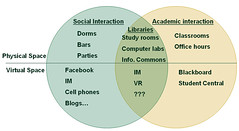Lecture Notes
Cataloging work generally takes place behind the scenes. Cataloging is a technology because it is comprised of procedures, machines, conventions, and knowledge. It is a complex procedure.
Information analysis and organization makes up the foundation of information dissemination and use. There are four main activities: acquistion, organization, storage and dissemination of information. The principal responsibilities of the professional librarian are 1)to establish, develop, and maintain information centers to preserve human knowledge, 2)to classify and organize human knowledge, and 3)to make human knowledge accessible.
Cataloging is part of field of bibliographic control which aids in location and retrieval of information - all types of information, not just print resources. Catalogs usually represent one institution's collection.
In 1961, IFLA defined the author/title catalog as one that allows user to figure out if a library has a book based on 1)its author and title 2)its title alone if there is no author or 3)a suitable substitute for the title.
The 1961 Paris Principles required that an author/title catalog allow users to determine which works by an author and which editions of a work were in the library.
Holistic vs. prescriptive technologies:
Holistic technologies - those that allow one to control the procedures and the processes. Prescriptive technologies - transfer control from the individual to the external agent. Cataloging is a prescriptive technology.
Cataloging - 3 activities:
1. description of physical object - based on physical examination - determined by Chaption 1 of AACR2 - need knowledge of AACR2
2. development of access points - main vs. added entries - primary and secondary authorship of work - use of cross referenences (see references and see also references) - use of rules in Part 2 of AACR2 - assignment of topical/subject headings using controlled vocabulary - not covered by AACR2 - use of LC Subject Headings
3. classification - pointer to physical location - allows for browsing - assignment of classification number based on subject and other identifying information to create call number - in class will concentrate on LC call numbers
Importance of LC in support documentation for cataloging.
MARC - Machine Readable Cataloging - LC is responsible for maintaining MARC standards
Chapter 1 from Lois Mai Chan's Cataloging and Classification: An Introduction
Bibliographic control - consists of indexing, classification & descriptive & subject cataloging.
Authority control - use of uniform terms for names and topics (as access points).
Bibliographic records - 2 parts
1) identifying data
2) atleast 1 access point
Main Entry Vs. Added EntriesMain entry - has full description - chief access point - usually the author/corporate body - useful to have standard convention for citation
Forms of Catalog:card catalogbook catalogmicroform catalogonline catalog
Arrangement of Records in Catalogalphabetical vs. systematic (or classified) - shelflist is a variant of a classified catalog
Cataloging Files
1) bibliographic file - represents library holdings - bib record for every item with multiple access points - 2 types of cross references (see and see also)
2) shelflist - subset of bib file arranged in shelf order - usually call number - for inventory control and to facilitate call number assignment - contains additional information like library holdings, notes
3) authority file(s) - standardized forms of names and topical terms that are used as headings (access points and their associated cross-references
Cataloging Procedures
1) descriptive cataloging - preparationof bib descriptions & determination of bib access points - drafting bib info (title, author, edition, place, date of publication, publisher, physical description, series info & notes - deciding on main & added entries as access points - deciding upon proper form for names and titles - done according to accepted standards (AACR2R)
2) subject analysis -subject cataloging - heading assignment & classification from authorized lists (LCSH or Sears)classification - fiting primary topic of work into classification scheme in use (LC or Dewey) - choose appropriate class number & add book number to form call number3) authority work - determination of standardized forms of subject terms and names - entails both descriptive & subject cataloging - access points are normalized and standardized - uniforms headings - headings are established when used for first time - cross-references are provided to allow access to variant names and for linked references (related headings) - authority work is considered to be most time-consuming & costly aspect of cataloging
MARC tagging
3 digit numerical code or field tag - subfields are id'd by alphabetic or numeric subfield code

